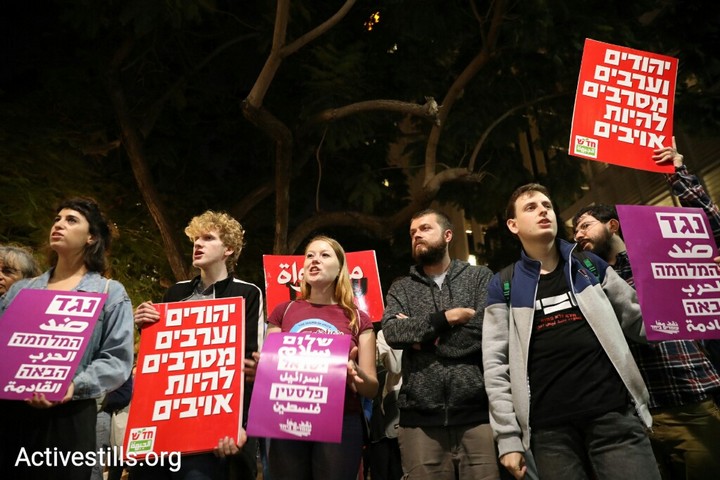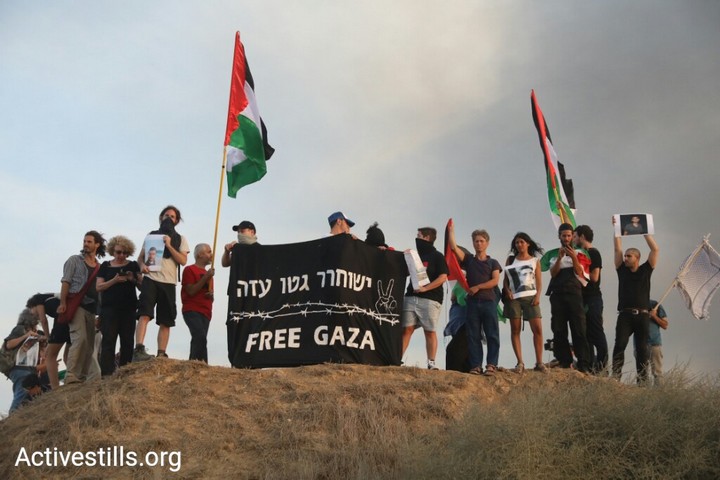By creating symmetry between Israelis and Arabs, Jews on the left are not only missing the bigger picture — they are actively taking part in erasing the Palestinian struggle.
By Rami Younis and Orly Noy

The sad state of the “left-wing camp” was clear long before the final results of the Israeli elections were published last week. Without skipping a beat, the ritual of declaring what is wrong with the left — and how to fix it — began.
Among the more popular of those suggestions was the cure-all “Jewish-Arab partnership” potion. The prescription sounds so ideologically correct and politically necessary that any criticism of it is often interpreted as jaded pedantry at best. And yet, it’s worth taking a more thorough look at the essence of that partnership.
Invisible Jewish hegemony
More than just expressing an aspiration for equality, the idea of Jewish-Arab partnership assumes symmetry. In that sense, it is a slightly updated version of the concept of “coexistence,” which has turned into somewhat of a curse word in the peace camp in recent years — and for good reason. It’s not that we oppose the idea of coexistence but rather that we have come to understand that coexistence doesn’t reflect distorted power relations between Jewish Israelis and Palestinians. It has become too comfortable of an expression to be used by those for whom the only coexistence they know is the kind between a horse and its rider.
It’s safe to assume that those calling for “Jewish-Arab partnership” don’t want that foolish type of coexistence, yet they benefit from the same imagined, dangerous sense of symmetry. It is no coincidence that Jewish-Ashkenazi men are those who typically lead those calls for partnership. Likewise, it is not merely symbolic that talk of Jewish-Arab partnership almost always puts Jewish before Arab, reflecting the invisible Jewish hegemony that forms the bedrock of the very concept.
The same asymmetry can be found in the unofficial slogan of the people and movements pushing partnership as the answer: “Jews and Arabs refuse to be enemies.” The importance of the oppressed refusing to be the enemy of his or her oppressor should not be diminished. But the oppressor needs to be asked something entirely different: he or she must refuse to lord over the oppressed. That cannot be accomplished in a reality of false symmetry.
That stands true not just for ethical reasons but also because a struggle that is captive to an alternate reality, as worthy as its vision may be, can never be effective. As long as Jewish hegemony remains invisible, the various ways it dictates how that partnership looks will, too, remain invisible by virtue of the same language of symmetry. Take for example the manifest published by Standing Together, the flagship movement of Jewish-Arab partnership, which states that it doesn’t believe in raising any national flags.
In our reality, the Jewish-Israeli flag is an obvious part of the landscape, while the Palestinian flag — and the existence of the Palestinian people, for that matter — are rejected, demeaned, and erased. Removing both flags, therefore, does not advance equality; it deepens inequality. In the real world, the blue-and-white flag does not need legitimization; the Palestinian flag does. Saying that flags can be excluded symmetrically is to deny that one’s fate here is determined by their national affiliation. That isn’t partnership — it is active participation in oppression.

The same invisible Jewish hegemony is also behind various proposals to merge or unite the Meretz, Labor, and Hadash political parties. Such a merger would once again mean Jews choosing with which “good Arabs” they can build a “partnership.” Doing so also delineates and de-legitimizes the “bad Arabs” who are not worthy of that partnership.
Remember the Nakba?
The false symmetry pushed by those who believe that “Jews and Arabs refuse to be enemies” is no less than dangerous. An entire establishment based on a racist ideology, Zionism, has worked tirelessly for 71 years to erase both the Palestinian narrative and Palestinian identity. Entire generations of Palestinian citizens of Israel are raised here without knowing they are, in fact, Palestinians — without knowing the injustices perpetrated against their own people. How is it possible that those same people who seek justice and equality only help perpetuate this situation?
And if many Palestinians don’t know from whence they came, how will they know where they are to go?
Doing away with national identity also serves one of the right’s most belabored clichés against the Palestinians. Every Palestinian who dares speak about the Nakba, the greatest injustice perpetrated here — and one which the Zionist establishment refuses to recognize — is immediately told by the token fascist in the room to move on and stop whining. Those same fascists refuse to understand, or perhaps choose to ignore, the bleeding wound of 1948, and the great historical problem of the Palestinian people.

Those who push for a Jewish-Arab partnership prefer to focus on 1967 as the year of the great injustice. But it is not. At best, they are blind to the reality, if only due to the fact that most Palestinians (especially in Gaza and the West Bank) focus on 1948. If all your Arab friends talk about ’67, you probably don’t have enough Arab friends.
Flying the Palestinian flag and taking pride in that identity is not a provocation — it is the duty of every politically conscious Palestinian, so that the struggle does not disappear for future generations. Those who support coexistence, who oppose these markers of pride and identity, are not true political allies; they are actively working against the Palestinians whom they patronizingly and arrogantly claim to protect.
One must wonder, then, who are the Arabs who join these “partnerships?” One must remember that the tendency of indigenous groups living under oppression to reach out to their oppressor — if only to stop the latter from destroying the lives of the former — is a natural one. Now think about how natural it is for Palestinians to say “yes” to so-called enlightened and progressive Jews who offer them cooperation. We often hear that many Palestinians choose to censor themselves in the presence of their partners so as to not anger those who tend to have privileges, connections, and very often, funding.
The coexistence crowd also ignores Palestinians living in the occupied territories. It is likely that most Jewish Israelis, including leftists, have never visited the West Bank nor formed ties with local Palestinian residents in a manner that allows them to understand what so many Palestinians are fighting for. Did they know, for example, that most support the right of return? If it were up to Palestinians alone, instead of chanting “Jews and Arabs refuse to be enemies,” they would prefer to chant “Palestinians and Jews support the right of return.” Why doesn’t this slogan actually exist? Because this “partnership” needs to remain palatable to Jews.

The dozens of Palestinians chanting the same slogan alongside you at demonstrations do not have a mandate to speak in the name of Palestinians, just as the authors of this article never received the right to speak in the name of refugees in Gaza. Yet that does not mean we must not fight for their rights.
This is a national struggle between an indigenous nation and a violent majority. Those who belong to the majority cannot lead or even pretend to belong to the leadership of the struggle against oppression. The first thing they must do is be conscious of their position as members of the oppressive group, as difficult and unpleasant as it may be. What they can and must do is stand in solidarity with struggles led by the oppressed. This is a revolutionary idea for many Jews with good intentions. It is, of course, a more difficult position to take, as it demands patience and listening to the issues facing the Palestinian public.
Earlier this week, Palestinian prisoners, who for years have been deprived of their rights and endured abuse in Israeli prisons, ended a hunger strike. There is nothing “symmetrical” about their issue. Palestinian prisoners who were part of the national struggle are persecuted and forced to pay a price. This is also difficult for the Jewish public to swallow. What place could the prisoner’s struggle ever have in a so-called partnership with a Jewish hegemony that hopes to win the hearts and minds of as many people as possible?
This article was first published in Hebrew on Local Call. Read it here.

